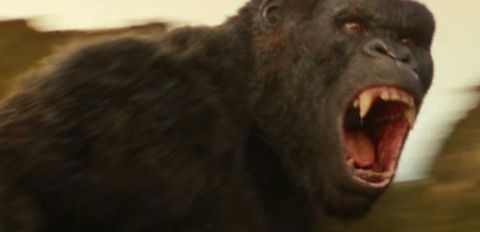Plainly put, director Jordan Vogt-Robert's Kong: Skull Island is a film that delivers on its promises. Set in the mid-1970s, it's angled as an era-infused monster movie with American soldiers seeing the battlefront move from the Indochina Peninsula to a Pacific island lost to time -- and it successfully piggybacks off themes of Vietnam War stories while positioning action-packed, beast-filled battles around every corner. It's a high-concept idea that really works, and while many internal elements remain paper thin, it remains an exciting new blockbuster arriving in the first quarter of the year.
The film is a cinematic universe sequel to the 2012 iteration of Godzilla (think of it as the relationship between Iron Man and Captain America: The First Avenger), and while it adds a few more creatures to the growing MonsterVerse and does a splash of world building, it also deserves full marks for very much standing as an independent and self-contained adventure. With a specific sense of style, it's an exercise that puts a whole lot of talented actors in exciting and consistent peril, and tracing an "A to B to C" narrative keeps things straight-forward while still raising the audience's pulse.
Kong boasts an impressively talented ensemble of performers with boots on the ground on Skull Island -- including Tom Hiddleston, Brie Larson, Samuel L. Jackson, John Goodman, John C. Reilly, Toby Kebbell, Corey Hawkins, Shea Whigham, Jason Mitchell, and more -- and while there isn't a bad performance in the group, the movie just doesn't have time to provide much in the way of character arcs for them. The modest exceptions to this are Reilly and Jackson, who respectively play a World War II pilot who has been lost on the island for decades, and a Lieutenant unable to let go of the Vietnam War -- but everyone else basically receives either a single personality trait or motivation to work with, and not much else.
In the character realm, Toby Kebbell draws the shortest straw playing soldier Jack Chaptman, as he is the only one in the central cast who finds himself stranded alone on Skull Island -- but the plus-side is that the actor pulled double duty during the production, and is a big part of one of the film's strongest elements: its visual effects. Just like how he brilliantly brought Koba to life in Dawn of the Planet of the Apes, Kebbell is back in performance capture ape mode as the eponymous cinematic legend in Kong: Skull Island, and the effects are spellbinding. It feels necessary to grip your armrests during introductory sequence where he's swatting down helicopters, and when Brie Larson's Mason Weaver shares a more tender moment with the god-sized creature you entirely believe they're face-to-face. The digital elements don't falter when it comes to the creation of many other beasties either, including the "villainous," lizard-like Skull Crawlers that serve up many of the movie's most frightening moments, but there's no questioning who is really in the spotlight.
Of course, these visual effects don't pop the way they do without the proper photography, and it's all the more impressive that this is only Jordan Vogt-Roberts' second film and first blockbuster. In collaboration with cinematographer Larry Fong, the director has made a feature that, in between all of the tension and horror, finds legitimate beauty in the epic landscapes (much of the movie shot on-location in Hawaii and Australia). Combined with a guitar-heavy soundtrack powered by the sounds of Creedence Clearwater Revival, David Bowie, Black Sabbath and more, Kong: Skull Island has an unmistakable, realistic, and story-enhancing aesthetic that gives the full package a welcomed and distinct flavor.
It has taken a short amount of time for 2017 to rack up a number of impressive event films, and while Kong: Skull Island probably won't be in the conversation when it comes to Top 10 lists at the end of the year, it will very likely remain a standout as a studio blockbuster. Some may roll their eyes at yet another big screen reboot featuring King Kong, but the movie is as legitimately fun as it is thrilling, and it simultaneously generates excitement about for futures of both the giant ape and his latest director.

Eric Eisenberg is the Assistant Managing Editor at CinemaBlend. After graduating Boston University and earning a bachelor’s degree in journalism, he took a part-time job as a staff writer for CinemaBlend, and after six months was offered the opportunity to move to Los Angeles and take on a newly created West Coast Editor position. Over a decade later, he's continuing to advance his interests and expertise. In addition to conducting filmmaker interviews and contributing to the news and feature content of the site, Eric also oversees the Movie Reviews section, writes the the weekend box office report (published Sundays), and is the site's resident Stephen King expert. He has two King-related columns.
Most Popular




